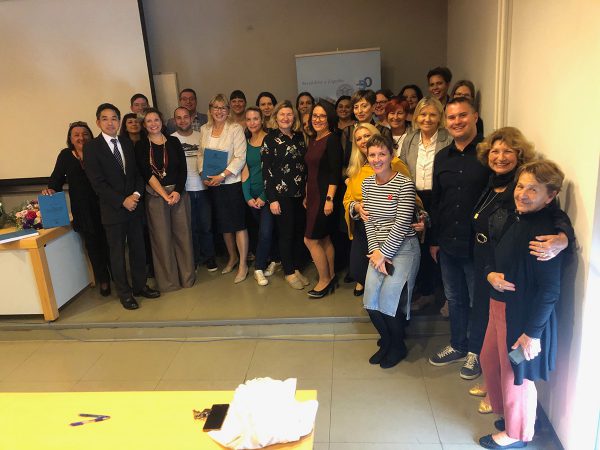Svetozar Musić, Ruđer Bošković Institute
Materials science is one of the fastest growing disciplines in the world, which is largely due to the fact that a short period of time elapses between many a fundamental discovery and it’s commercial application. The possibility of rapid commercialization of knowledge is particularly evident in the systematic investigation of structure on the nanometer scale, or the development of new nanotechnologies. A lot of developed countries have recognized this field of research as crucial in economic development, and are therefore establishing new institutes, graduate and postgraduate studies in research areas of functional materials and nanostructures. In Croatia, this research area is best represented at the Ruđer Bošković Institute (RBI) within the Department of Material Chemistry, Department of Material Physics, and in several laboratories and other groups within the Institute. This area is most strongly represented at the RBI in the number of scientists, the number of published papers, citations, scientific equipment and research focus in the Republic of Croatia. Scientists at RBI under this program create new organizational conditions that will allow the synergy effects of more effective research, better focus on issues and achieving the necessary conditions for the commercialization of scientific discoveries. We are currently working on establishing the Institute for functional materials and nanostructures. Due to the use of different methods of synthesis (inorganic, organic, organic-metal, etc.) and deposition techniques (physical and chemical) as well as many physical and chemical methods of characterization, in research of advanced functional materials and nanostructures the interdisciplinary approach of scientists from different fields is necessary. Therefore, the Institute gathers chemists (inorganic, organic, polymer) physicists (solid state physics, atomic and molecular physics, semiconductors) scientists and engineers and other professions in order to improve targeted basic research closest to the development of new technologies and production based on new knowledge. The research focuses on functional materials with new optical, luminescent, electroluminescent, photovoltaic, magnetic and catalytic properties as well as the different morphology of nanostructures (nanoparticles, nanotubes, nanofilms, nanocavities, …) whose design, controlled combining and quantum-mechanical properties determine their function (hybrid systems, functionalized nanoparticles, molecules, polymers, dendrimers etc.). Special attention has been focused on the design of nanonstructured objects that promote the function of material as well as correlation of quantum-mechanical properties of nanostructures with macroscopic properties of complex systems, which emerges from the organization of nanostructures of thin films or solid surface. Ruđer Bošković Institute has a long experience in research of synthesis and properties of magnetic oxides (ferrite). Based on the properties of metal oxides it is possible to develop new optoelectronic and electronic elements, such as LEDs, magnetic field sensors, temperature sensors, inertia- and flow sensors. These materials in the shape of thin films, sinters or composites have numerous applications in electronics and electrical engineering as well as protection from harmful high frequency radiation. There is a possibility of developing new electrode materials for electrochemical power sources, and the newest generation of electrochemical solar cells. The company Rade Koncar is very interested in these products, which they import from abroad at high cost and which are built into their products in large quantities. The annual value can reach millions of Euros. Currently the main problem in the research and eventual commercialization of the results lies in the lack of clean room with installed components for photolithography. Semiconductor Industry Cluster SEMICRO, Faculty of Electrical Engineering and Computing, Institute of Physics, Faculty of Science, Faculty of Medicine, Faculty of Chemical Engineering and Technology, Koncar – Electrical Industries d.d., Applied Ceramics Sisak, CET- Microelectronics, Systemcom Zagreb, Solvis Varaždin, etc. Due to high intellectual shares in such products, the profits in this business are high, too. Based on current results of nearly a thousand CC works and over ten thousands of citations in the field of nanostructured research, this generation of scientists in the RBI and IFS deserve confidence for further development for the benefit of the Croatian economy.
[BACK]

